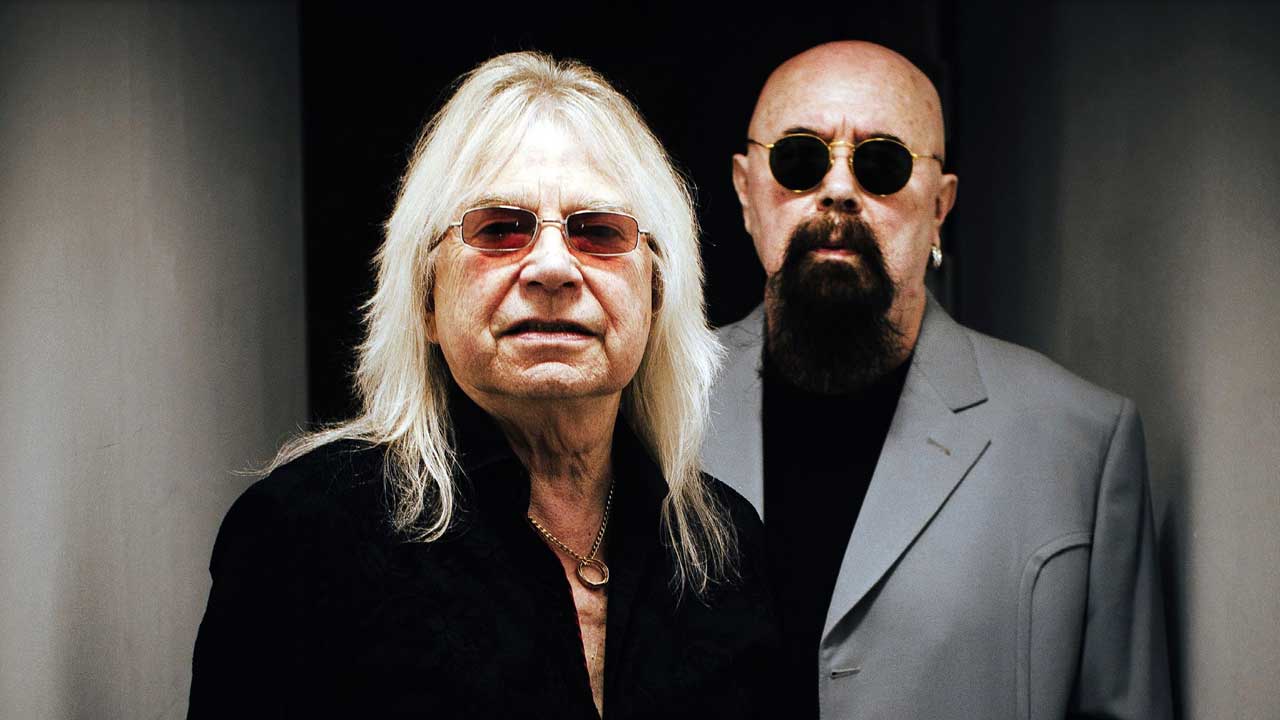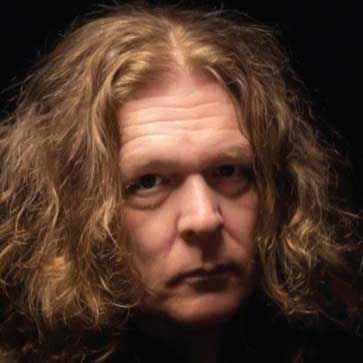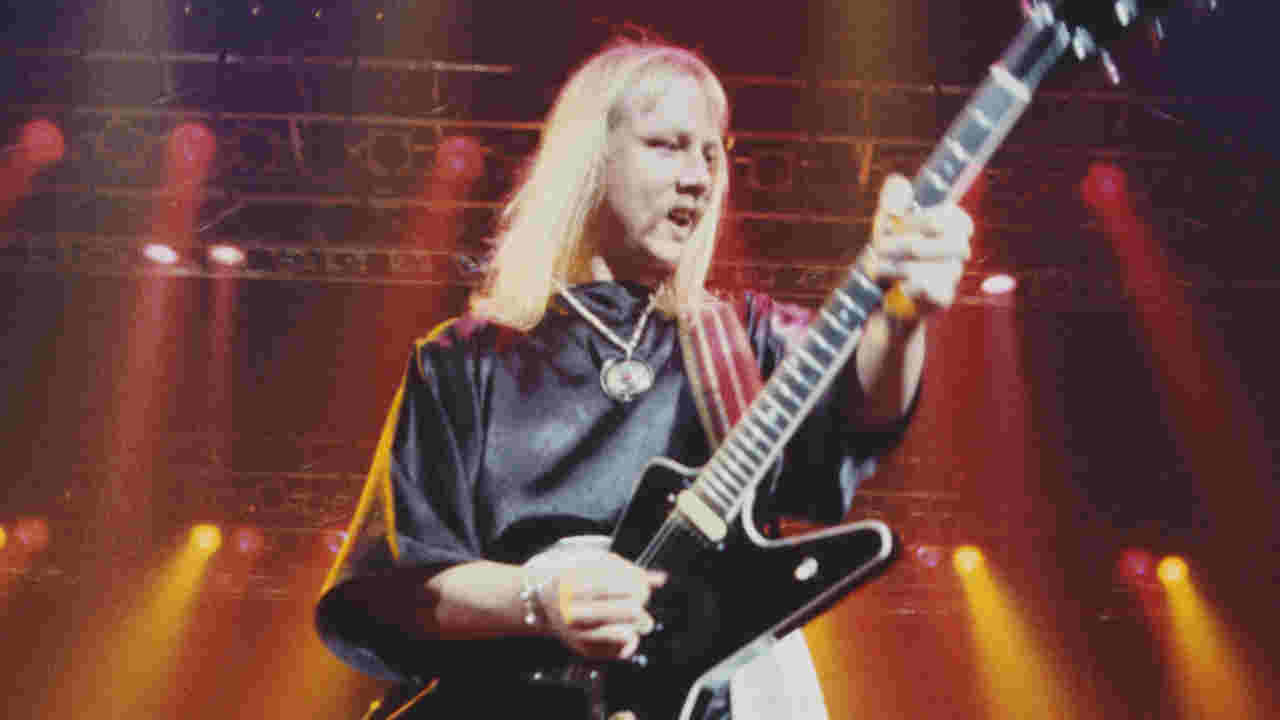50 years of melody: Bob Catley's essential Magnum albums
Magnum vocalist Bob Catley examines half a century of band back catalogue and talks about some of his favourites

Formed in Birmingham in 1972 by vocalist Bob Catley and guitarist Tony Clarkin, Magnum began their career playing as the house band at the city’s renowned Rum Runner club. A desire to follow their own musical path eventually cost them the Rum Runner gig, but spurred Clarkin to reveal a gift for crafting the kind of majestic, uplifting hard rock songs that made them a much-loved band among their many loyal fans, especially in their 80s heyday.
Their stirring sound has attracted an audience sufficient to sustain them over six decades, from hit albums and arena shows in the 80s, through a brief hiatus during hard rock’s 90s downturn, and on to a hard-won resurgence in the past 10 years.
As they celebrate their fiftieth anniversary with new album The Monster Roars, Bob Catley guides Classic Rock through some of their essential albums.

Kingdom Of Madness (Jet, 1978)
You can trust Louder
"We got the sack from the Rum Runner for doing stuff we thought was cool – Steely Dan and Steve Miller, not just Top 40 stuff. Tony Iommi, John Bonham and Cozy Powell used to come down after their gigs and get on stage. That killed us off, they got a DJ.
“Tony said: ‘I’ve got some songs, let’s record them.’ We made demos at Nest Studios in Birmingham. David Arden [Jet Records manager], Sharon Osbourne’s brother, liked them and invited us to record an album at De Lane Lea studios in London. We recorded it in 1976. We had to sleep in the cafeteria. The next morning the London Symphony Orchestra were coming in, saying: ‘Who’s this load of tramps?’ It was us, sprawled over the carpet.
“We liked Queen’s harmonies. You can hear the Queen influence big-time in our harmonies on the album. It took two years to come out. Punk was happening, and we thought: ‘This is going to go down like a lead balloon.’ But it went in the charts [No.58]. A good start. It boded well."
Chase The Dragon (Jet, 1982)
“Chase The Dragon was when our sound started becoming the Magnum you’d expect to hear, with the epic keyboards and the magnificent guitars. It was recorded in 1980 with Jeff Glixman producing. Some great songs; Soldier Of The Line, and I love The Spirit. That has great lyrics, it means a lot to me.
"People say The Spirit has kept them going in times of being down. Tony has written a lot of songs like that. If you’re down, they lift your spirits. We were supporting Krokus in the UK when Chase The Dragon came out. Their album went in at number thirty or something, ours went in at seventeen!
"The UK success of the Chase The Dragon album led to us touring with Ozzy Osbourne in America, the second part of the tour, after [Ozzy’s guitarist] Randy Rhoads’s terrible accident. Ozzy was doing enormous arenas at that time, it was completely new to us. They hadn’t heard of us there, but we really went down well.”
On A Storyteller's Night (FM Polydor, 1985)
"One of my favourites. A new beginning for Magnum, slightly more commercial songs that people could get into more easily. We toured the songs before we recorded them, to see how they would go down. The audience loved them. We thought: ‘This is going to work.’
"We recorded in UB40’s studio in Birmingham in early 1985. The songs were great; How Far Jerusalem, Just Like An Arrow, Les Morts Dansants. For a singer, to sing those songs is wonderful. It worked, we opened ourselves up to a wider audience in the UK. We did many tours. We played Monsters Of Rock in 1985, and got offered a world deal with Polydor. They put it out again, and it sold again
“On A Storyteller’s Night put us in the limelight. I don’t think we’d have done a lot without the success of that album. We still do a lot of those songs, they’re still relevant to the fans. They wouldn’t let us not play them.”
Vigilante (Polydor, 1986)
“We were looking for a ‘name’ producer. Roger Taylor was mentioned, and we said: ‘Oh yeah! Can we have him?’ We went to Queen’s Mountain Studios in Montreux in 1986, for about three months. Fantastic when you’ve been a Queen fan all those years.
“Queen had the Magic tour coming up, so Roger kept popping off. Dave Richards, the engineer, took over and was great. They had the loudest speakers in the world. He put Lonely Night on, and said: ‘Do you want to hear it loud?’ We said: ‘Yeah.’ He turned it up full, and we ran for our lives out of the control room [laughs]. It just blew you away.
“We got invited to Wembley the next year, to watch Queen’s last show on the Magic tour, and to the after-tour party. It was great, a crazy party. It was nice to be ‘Roger’s band’, under his wing. I love When The World Comes Down and Back Street Kid. We still do Vigilante.”
Wings Of Heaven (Polydor, 1988)
“Tony started writing as soon as we got back from the Vigilante tour. It was deemed that we’d record at Polydor’s Wisseloord Studios in Holland, with their new producer Albert Boekhold. It started off alright, but got bogged down with new technology, keyboard and drum stuff. It wasn’t sounding great. We listened to it when we got back, the Christmas before it came out, and it was: ‘Oh no! We can’t put this out.’
“We hired Joe Barbaria and Ross Cullum to remix everything in two weeks, because it was due out in April. They turned it around and saved our bacon. It came out to rave reviews and was the best-selling album we’ve ever had – number five in the UK. Nobody knew that we nearly didn’t have an album.
“On tour, I enjoyed playing the Birmingham NEC arena but I still longed for the clubs, really. At the NEC, you turn around and ‘Where’s everybody gone?’ I’m used to Tony on my right, and the drummer up my bottom behind me [laughs]. But I’d love to do it again, bring it on."
Goodnight LA (Polydor, 1990)
“The label said: ‘Do you fancy writing with other people?’ Tony went along with it, I didn’t quite go along with it. I wasn’t looking at it as our label would – how to make the band more successful in America. Tony started writing with Russ Ballard in London, and came up with Rockin’ Chair, which was great. He went to America and wrote with Jim Vallance [one of Bryan Adams’s writing partners].
“We went over to record with Keith Olsen at Goodnight LA studios. It was a big push for Magnum to appeal to an American audience. There was disagreement between Keith Olsen’s management and our UK management on who would handle Magnum in the States. They couldn’t agree, so after all that it didn’t even come out in America.
"Which is a shame, because it’s a bloody good album. I’m sure the Americans would have lapped it up. A lot of people loved the album. Some thought we’d gone American. The following year we put out a live album, The Spirit, to say: ‘We’re Magnum, we’re English, really!’”
On The Thirteenth Day (SPV, 2012)
“Was the higher chart placing a big deal at the time? [No.43 in the UK, Magnum’s highest placing since 1992’s Sleepwalking] Yeah! On The Thirteenth Day is a great album. On stage we used to start with All The Dreamers. That was enormous when it kicked off.
"Dance Of The Black Tattoo, that’s a proper Magnum epic, a brilliant anti-war song lyric-wise. I love it. I think we’re probably bringing that back for the next tour. It’s a great title. We did a compilation called Dance Of The Black Tattoo last January.
“The cover for On The Thirteenth Day was great, by Rodney Matthews [legendary album cover artist closely associated with Magnum, who did 80s favourites including On A Storytellers Night and several recent albums] again, with the little devil on the front.”
Lost On The Road To Eternity (SPV, 2018)
“The year before, me and Tony had been on something called Rock Meets Classic, playing arenas around Germany alongside an orchestra from the Czech Republic. We struck up a relationship with the conductor, Wolf Kerschek, and Tony asked him to orchestrate two of the songs on the album. The full orchestra sounds wonderful on the title track.
"Tony also said: ‘Do you want your mate Tobias Sammet [vocalist with Avantasia and Edguy] to appear on a song?’ I said to Tobias: ‘I’ve been on enough Avantasia songs, you come and return the favour!’ He sang on the title track with me, in his own inimitable way. We got him up at the Birmingham Symphony Hall on the tour, and that went down great.”
The Monster Roars (SPV, 2022)
“In March 2020 we spent three weeks rehearsing [for the Serpent Rings tour] with our new bass player, Dennis Ward [ex-Pink Cream 69]. With three days to go, the news came through that the tour would have to be postponed.
“Tony had some songs partly written, so instead of sitting at home feeling sorry for ourselves we started recording the new album a year up-front. We took a break, and started again this year. In that time Tony had totally rewritten one of the tracks, because it wasn’t working. It became Your Blood Is Violence, one of the epic songs on the album. Dennis is a fantastic bassist, and his voice matches mine for the harmonies. I’m looking forward to working with him on the fiftieth anniversary tour.
“Me and Tony have got a long way to go yet. We’ve come a long way together, and we enjoy working together. We ain’t finished yet.”
The Monster Roars is out now.
Sign up below to get the latest from Classic Rock, plus exclusive special offers, direct to your inbox!
Rich Davenport is a music journalist, stand-up comedian and musician, and has been a regular contributor to Classic Rock since 2016

